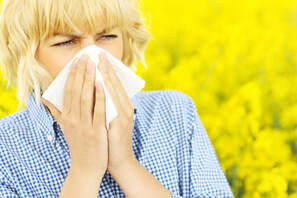|
by Dr. Jessica Corbeille Harris, ND
Physical reactions to foods are common, but not all physical responses are classified as a true “food allergy” – many are deemed “food intolerances” instead. What’s the difference? Food Allergies: An immediate immune system response to a food (even a tiny amount of that food) that causes sometimes widespread involvement in the body including (but not limited to) hives, anaphylaxis (closure of airway), asthma reaction, swelling, itching, or immediate GI distress/diarrhea. Food Intolerance: An immune system response that is often delayed and can cause wide-spread, non-specific, sometimes less severe systemic responses. Sometimes a little bit of the food isn’t enough to trigger symptoms (but sometimes it is!). Common food intolerance symptoms include: GI upset (most common), increase in muscle and/or joint pain, headache, irritability/mood changes, depression/anxiety, breathing difficulties (less severe than an asthma attack or anaphylaxis), heartburn, ear infections, sinus congestion, post-nasal drip, urinary pain or discomfort, skin reactions (eczema, psoriasis, rashes, etc.), heart palpitations, and more. Basically, many of the symptoms people experience regularly can be caused by the foods they are eating. It’s important to understand the difference between a true allergy and an intolerance, but often in either case, the problematic food/foods will be avoided (obviously this is a much more serious recommendation in the case of anaphylactic food allergens!). One important symptom that I like to point out to patients at my clinic is the association with food to pain.The majority of my patients seek treatment with me for their pain, but many of them are not expecting me to suggest a food allergy/intolerance test as part of the work-up for the cause of their pain. Yes, I do like to treat pain with injection therapies (i.e. prolotherapies, PRP, neural therapies, etc.), but if the patient continues to eat a food that is causing them inflammation (pain), then the treatments are not likely to have a lasting effect – and sometimes they don’t work at all until the problematic food(s) are eliminated. For this reason, I often will order a food intolerance test for patients as part of their initial workup when I suspect food as a component to their pain problem. The testing I use is relatively inexpensive and results come back quickly. These tests are really excellent ways to figure out quickly the most likely problematic food triggers for their body – and I OFTEN see that eliminating problematic foods for a period of time (or for good) will SIGNIFICANTLY change their pain problem! Are you ready to explore your food intolerances? If so, send us a message through our Contact page today!
0 Comments
 by Dr. Jessica Corbeille Harris, ND It’s that time of year again – cherry blossom trees are beautifying our world, but oh boy – these pollens are making my eyes water so much I can’t even see the cherry blossom trees! What are your home remedies for allergies? Do you have to resort to the over-the-counter decongestants? Did you know there are several very effective natural alternatives? Check out my list below of my 3 favorite natural allergy remedies. And if you’re still plugged up even after trying these, you may consider discussing your case with me to see if you’re a candidate for neural therapy for your sinuses!
Here are a few of my favorite products that you can find on my online dispensary (https://wellevate.me/jessica-corbeille/#/). Just type in the names as I have them below to find online. Remember you receive free shipping on orders over $49!!
As a reminder, always discuss your current medications and problem list with your physician before starting new products – natural or not. Even natural products interact with medications. In health, Dr. Corbeille |
AuthorThe Doctors at ENH post to this page regularly with new health information, home remedies, and other interesting tidbits. Archives
May 2024
Categories
All
|
DISCLAIMER: THIS WEBSITE DOES NOT OFFER MEDICAL ADVICE. THE CONTENT OF THIS ELEVATED NATURAL HEALTH WEBSITE AND ANY LINKS INCLUDED ARE INTENDED ONLY FOR EDUCATIONAL AND INFORMATIONAL PURPOSES OR TO DESCRIBE THE CLINICS PRODUCTS AND SERVICES. THIS WEBSITE AND ITS CONTENT ARE NOT INTENDED TO PROVIDE PROFESSIONAL MEDICAL ADVICE, DIAGNOSE THE HEALTH CONDITION OF ANY INDIVIDUAL OR SUBSTITUTE FOR PROFESSIONAL GUIDANCE IN THE ADMINISTRATION OF ANY TREATMENT. YOU SHOULD ALWAYS SEEK THE ADVICE OF A LICENSED PHYSICIAN OR OTHER QUALIFIED HEALTHCARE PRACTITIONER REGARDING ANY PERSONAL CONCERNS AS TO SYMPTOMS, MEDICAL CONDITIONS, OR THE USE OF ANY PRODUCTS. SUCH COUNSEL SHOULD NOT BE DISREGARDED OR DELAYED BASED UPON ANY INFORMATION CONTAINED WITHIN THIS WEBSITE. DR. JESSICA CORBEILLE-HARRIS, ND AND DR. MCKENZIE J TIMMER, ND EACH HAVE A DOCTORATE IN NATUROPATHIC MEDICINE AND ARE LICENSED NATUROPATHIC PHYSICIANS IN THE STATE OF WASHINGTON. ANY REFERENCE TO THE PRACTICE OF NATUROPATHIC MEDICINE DOES NOT APPLY IN STATES WHERE NATUROPATHIC MEDICINE IS NOT LICENSED.
Proudly powered by Weebly

 RSS Feed
RSS Feed